

There’s a delightful shop in my neighborhood that sells gifts and textiles from Nepal. The woman who runs it is so charming that I once bought an unflattering dress just to show my appreciation for the complementary cup of herbal tea she offered me. Peppered on the walls of her store are dozens of lotus flowers.
They are printed on plain cards, which are given to customers on the condition that they colour them in at home and bring them back. I accepted one of these cards alongside an early purchase of a candle stick, safe in the knowledge that I would never actually complete the task. What adult has time for colouring anyway, I asked myself as I scrolled through Britney Spears’ Instagram feed. But it was a nice thought, and I used the card as a bookmark. The lotus flower must have stuck with me subconsciously though, because one day I found myself buying colouring pencils. I used them very occasionally to highlight important items on my to-do lists. The feel of their pointy nibs cracking ever so slightly on the scrap paper brought back indistinct memories of being a child. But I still didn’t colour the lotus flower.
In his final column for The Guardian in September 2020, the author Oliver Burkeman urged readers to lean into the practices that in his own words “strike you as intolerably cheesy or self-indulgent.”
The examples he cited included gratitude journals, mindfulness meditation and seeing a therapist. The more they make you cringe, the more worthwhile they might be, he argued.
For me, adult colouring books are a veritable source of cringe. I roll my eyes as I pass the mindfulness section of a bookshop, advancing smugly to the counter with the latest Elizabeth Strout instead of some remedial artbook for adults. And yet, as I pass the stand, the image of a nice cup of tea and some colouring pencils pops into my head. I quash the thought immediately. The reason for my contempt naturally lies in my refusal to acknowledge the vast chasm between who I am and who I want to be. Ideally, I would be a person with an attention span long enough not to need a colouring book to refocus my mind. Deep down, I know this to be untrue.
The shame that accompanies our inability to focus reminds us that attention is a commodity with a moral as well as monetary value. This distinguishes it from other resources which tend to have logistical, geographical or political explanations for scarcity. The late Nobel laureate economist Herbert Simon is credited with coining the term “attention economy.” Key to understanding the term, he believed was the acknowledgement of the inverse relationship between information and attention. The more of the former we have, the less of the latter we employ.
This has implications in all kinds of domains. Populist politicians have always relied on people’s reluctance to spend too much cognitive energy analysing the credibility of a punchy sound bite. This is especially poignant in an age where much of the world resists the opportunity to consult the abundance of credible sources of information at their fingertips.
The phenomenon is equally unnerving in the media. News stories that don’t immediately hook the attention are relegated in favor of those that provide an immediate dopamine kick. Algorithms reinforce the trend. Except of course for the mindful among us. You can identify them relatively easily by their penchant for buying newspapers, shunning social media and pausing before they speak.
These rare diamonds of the attention economy offer a glimpse of what life could be if only we could focus. Populist politicians would be eliminated at the ballot boxes. Science would triumph. Our climate would have some chance of being saved.
Visit news.dtnext.in to explore our interactive epaper!
Download the DT Next app for more exciting features!
Click here for iOS
Click here for Android